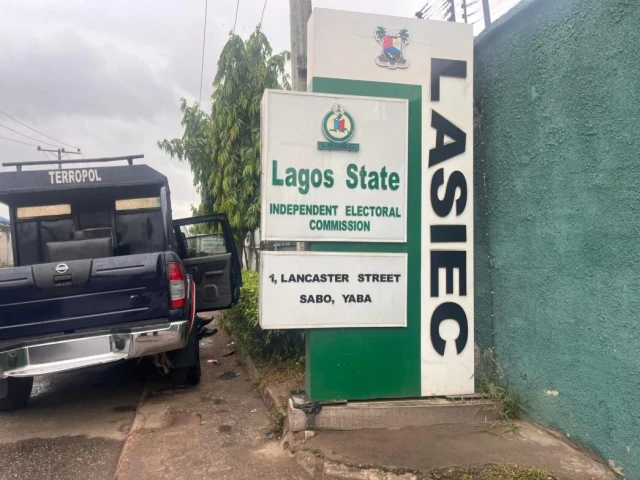LAGOS, Nigeria - Heavy security presence was observed at the headquarters of the Lagos State Independent Electoral Commission (LASIEC) in Yaba on Saturday as local government elections took place across the state.
Uniformed officers from the police, civil defence corps, and intelligence services were stationed at key points, with roadblocks erected to control access to the LASIEC premises.
In Badagry, similar security arrangements were in effect, with personnel from law enforcement and traffic agencies deployed to maintain peace.
Movement restrictions were strictly enforced in areas such as the Mosan-Okunola Local Council Development Area, where residents complied with the directive. By 9 a.m., streets in Alimosho—including Abesan Gate Road, Akowonjo Road, and the Ipaja-Ayobo route—were largely deserted, with only security agents, electoral officials, and accredited observers visible.
Shops, markets, and motor parks remained closed, and commercial transport operators largely stayed off the roads. Security teams, including personnel from law enforcement, drug control, and road safety agencies, were stationed at critical intersections to ensure order.
Many residents commended the level of compliance, suggesting it contributed to the orderly atmosphere around the polls. “I’m pleased that people are following the movement restrictions. It shows a growing awareness of the importance of organized elections,” said Mrs. Dauda Bosede, a voter in Alimosho.
The elections are being conducted across 20 constitutionally recognized local government areas and 37 local council development areas, covering 57 councils and 376 electoral wards in total.
However, logistical challenges marred the voting process in some locations. At polling units 061 and 008 in Ojodu, no electoral officials had arrived as of 11 a.m., despite voters waiting since early morning.
“We’ve been here since 7 a.m. and there’s still no one from the electoral body,” said one frustrated resident. Another voter, who traveled from outside the city to participate, had to leave without voting.
Residents reported that they had checked multiple polling locations in Ojodu but found no sign of officials. Some voters suggested the delays were due to a lack of transportation for staff. “Should we be the ones waiting for them, or should they arrive here before us?” asked Mr. Ogunleke Adejobi. Meanwhile, local youth, disillusioned by the lack of activity, were seen idling at garages and playing football in the area.
Elsewhere, Governor Babajide Sanwo-Olu cast his vote at Polling Unit 006, Ward E, located at St. Stephen’s Nursery and Primary School in Lagos Island.
He was joined by his wife at around 11 a.m. Voting at the unit reportedly began at 8 a.m. In nearby areas, some polling stations experienced delays due to the late arrival of party agents. Despite the general lockdown, business remained brisk at Mile 12 market, where traders continued to operate.
Turnout remained a concern in multiple locations. LASIEC officials expressed disappointment over the low voter participation in Ikosi-Isheri Local Council Development Area.
Despite timely deployment of electoral materials and staff, attendance at polling units remained poor hours into the process. At one unit with 1,273 registered voters, only 20 had voted by 11 a.m., while another saw just 7 out of 1,029 registered voters participate. Poll workers reported being on site since 8 a.m., waiting for voters to arrive.
The local government elections are intended to elect council chairpersons and members—roles essential to community-level governance.
However, challenges such as voter apathy, limited public awareness, and logistical shortcomings continue to impact the effectiveness of the electoral process. LASIEC has acknowledged these issues and pledged to improve in future exercises.




















